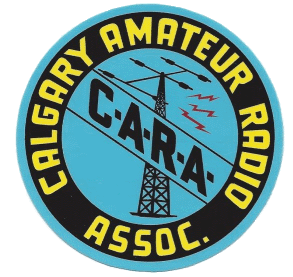Hello all;
It was a great event! I hope that everyone else had as good a time as I did - it's hard to beat a day out in the mountains doing mobile radio operations! I needed a day to recover, so here is my summary of the rally day at last.
First off, I want to thank all the radio operators who put in time and effort for training and operation at the rally. It's a credit to the quality of CARA members that we were able to pull it off so well, despite the cold weather and technical challenges. Nice job!
I was impressed with how well everyone implemented the material from the training session. With that material, you guys easily handled the technical problems that we experienced on rally day. Thanks to everyone who made time to attend the training.
It was great to once again work with our partners from the Calgary Sports Car Club. They have so much enthusiasm, are very knowledgeable, and know how to have a good time while getting the job done. I look forward to collaborating with them on future rallies and continually improving our planning processes so that we can get timely information to our radio operator volunteers.
This was my first time in the role of Radio Coordinator, so I appreciate everyone's support and patience as I learned the ropes. In particular, I'd like to thank CARA members: Dave Cason, Harry Maylor, Dana Harding, Gord Hungerford, Robin Greig, and Rob Wilson for their extra support in pulling together the CARA responsibilities for this rally. The success of the event is largely a result of efforts made by these people. In the future, there should likely be two or three CARA members involved in planning the radio operations part of a rally - there's plenty to do in getting ready for these things! So, if you're interested, step forward and put your name into the hat!
Despite all the successes we had on Sunday, we did have some technical challenges. The VE6GAB repeater is a solar powered unit, and while it was working fine on the Saturday afternoon before the rally, it seems the batteries got drained overnight. Perhaps the very cold weather had something to do with it. Given the situation, we decided to move the Rally Control traffic to the backup simplex channel. After the sun had been up for a couple of hours, the VE6GAB repeater came back to life and we were able to use it for some of the logistics support traffic. However, since we didn't know how much charge would be in the batteries, the Rally Masters didn't feel confident using VE6GAB for the primary Rally Control channel. The safety implications of having the primary channel fail in the middle of a rally stage led the Rally Masters to decide that it was best to continue using the backup simplex channel for this purpose. In any case, we are grateful to Dave (VE6GAD) for his permission to use this repeater for the rally.
Clearly Murphy's Law was working overtime on rally day, as we encountered some serious problems with the VE6AUY repeater, as well. The squelch tail noise had been known to occur intermittently in the past, but on rally day it was very loud and very consistent, rendering use of this repeater very difficult. I appreciate everyone being so tolerant of the situation and making the best of it. A request for attention to this problem has been submitted and perhaps it will be addressed in the near future.
On a positive note, APRS seems to have functioned as expected! Use of this technology proved helpful in managing the arrival and departure of field units, and was particularly handy in assisting lost drivers. I hope that we can continue to promote and improve use of this technology for field events, such as rallies.
On a side note, for future rallies we may consider deploying a temporary portable repeater. This approach has certain advantages, as it could provide options that are difficult to obtain with fixed repeaters. For example, it may be possible to relocate a portable repeater that is experiencing interference, or reorient the antenna for improved coverage of a venue. However, anytime we deploy such technology, we also have to consider the logistics of setup, takedown, power, configuration, and fail soft operation. We'll be looking into what it takes to make something like this happen.
Finally, the introduction of a two-channel approach to managing radio traffic was generally successful, and received positive feedback from rally officials and radio operators. With the rally stage operations traffic on the primary channel, and the logistics and support functions taking place on a secondary channel, we were able to smoothly get our field units into place and safely back out without distracting the rally control operators. CARA operators did a good job of handling the procedural changes associated with switching between the two channels.
In closing, perhaps the most important lesson is that preparation is vital to success in these events. We simply do not control many of the "day-of" variables, such as weather, technical failures, and mistakes. However, we do have control over what we do *before* the event to get ready for it. By taking the time to be well prepared, the system is resilient enough to handle almost anything that gets thrown at it.
73,
Garry Spicer
VE6GDS
CARA Radio Coordinator, Cochrane Winter Rally 2017

